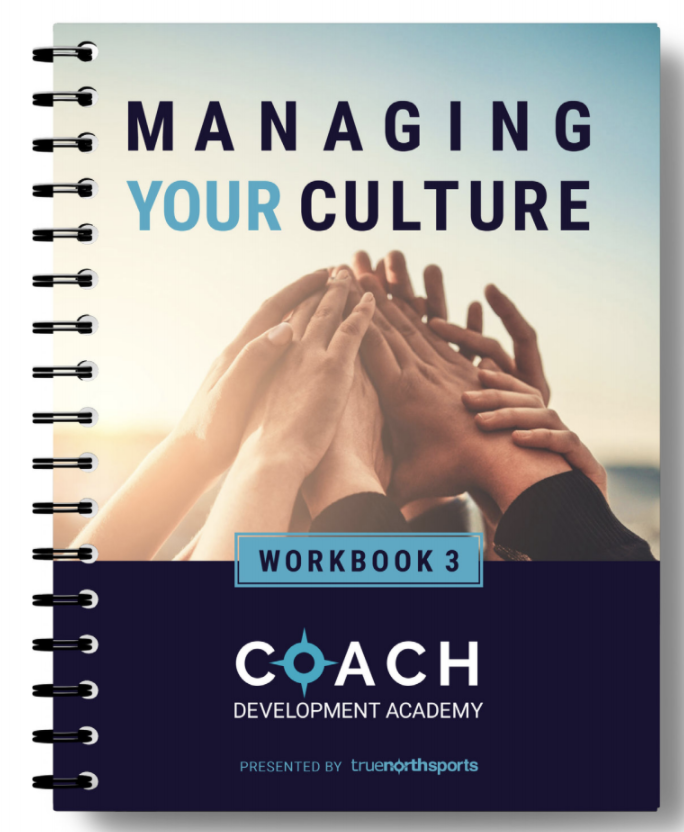“I found that you’re going to be rewarded at the end because then they become strong women that are ready to take on the world.”
Matt Ulmer was named the Head Women’s Volleyball coach at the University of Oregon in 2017. And while his days as a player and coach’s son are behind him, he couldn’t be happier being the Head Coach because this is what he was always meant to do.
“I was the son of a coach and have been in the gym my whole life. My mom is a volleyball coach, she coached men’s volleyball players a little bit, but the majority of the time it was women’s volleyball. So I got into that world very young.”
Coach Ulmer’s mother, Leanne Ulmer, is the Head Women’s Volleyball coach at Carthage College where she has coached for 20 years and holds almost every record imaginable (542-163, .769 winning percentage, 20 years). A school close to Matt’s heart as well, as this is where he played college volleyball.
“I started playing at a young age and developed some really good skills because I was always tied to volleyball. Helping my mom out at practice and playing with people much older than I was. But I didn’t grow until really late…I was 4’11 as a freshman in high school. Like I could walk under the guy’s net without ducking back. Everybody else was already tall. I wasn’t. I graduated high school 5’11, so still not very tall, then grew eight inches in college. Quickly becoming 6’7. So I became a pretty good volleyball player, but not until much later on. It wasn’t until my last three years of college that I became decent.”
When he finished playing at Carthage, where he ranks in the top 10 in career and season statistical leaders in assists, aces, and solo blocks. But even after a Hall-of-Fame career he still had his mind set on coaching and felt like it was his calling.
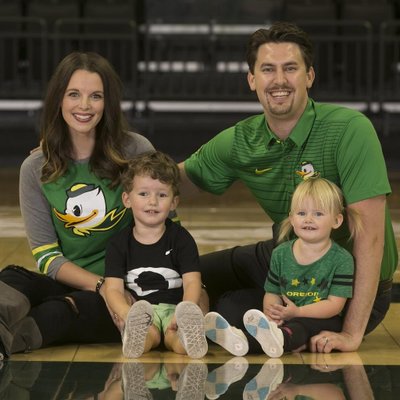
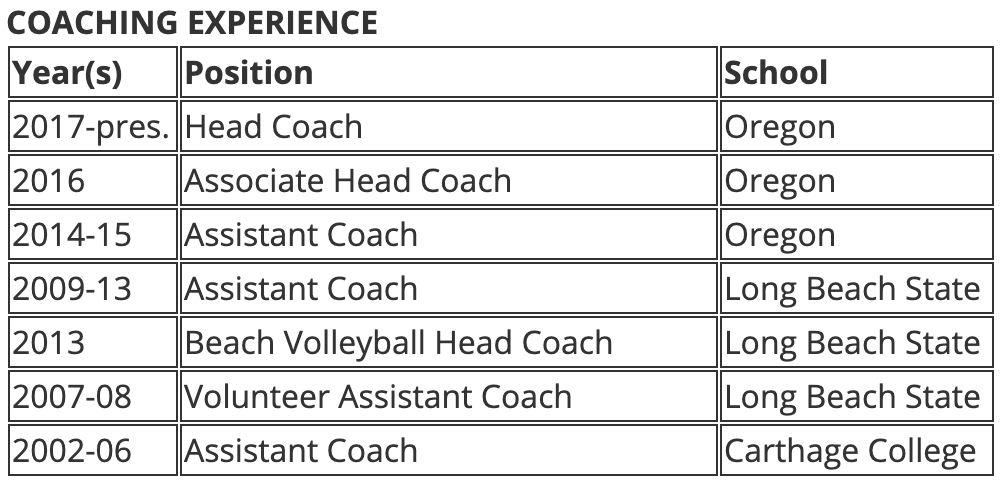
Born to do this
“I knew I wanted to coach much earlier than when I even knew I would be good at volleyball. So I think my mind always just knew this is what this is where my passion is. That’s what I love to do. I do love to play the game. But it was always driven more towards coaching the team side of it than the professional aspect. When I became good enough and I had the chance to maybe go play and pursue a career to play professionally, I had already developed my brain around wanting to coach.”
After coaching 5 seasons with his mother at Carthage College. Ulmer took an opportunity at Long Beach State as a volunteer assistant.
“I was able to go out to Long Beach State and volunteer for two of the greatest coaches of all time, Brian Gimmillaro and Debbie Green, and one of the best volleyball programs of all time. I got that chance at a young age and I went for it.”
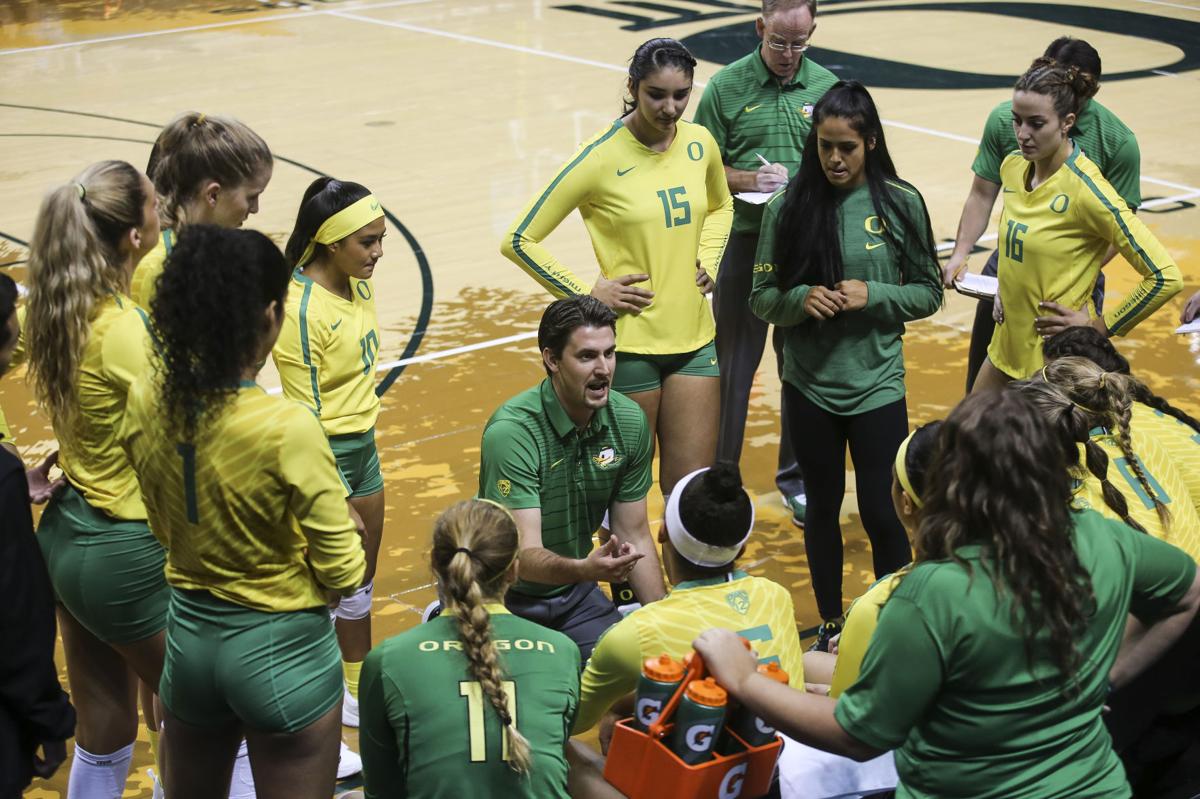
Wasting no time at Long Beach State, he worked his way up the ladder quickly. And by 2013 he had become the youngest head coach to win a national volleyball title of any kind when he guided the 49ers to the sand volleyball crown. This quickly caught the attention of schools and soon enough he was offered an assistant coaching job at the University of Oregon. Where he was named Head Coach four years later.
Looking back at how he navigated the coaching ranks, he doesn’t think he would have adjusted his path if allowed to do it all over again.
“I don’t think I would have done anything any differently. And the reason I say that is because I’ve just learned so much through trial and error. It’s like all my mistakes and all my thinking about what I knew and then realizing that I really don’t know and then doing that over and over again, I think that’s a really important process. I think everything I went through got me to where I want to be, which is at Oregon as the head coach. And so I’ve had good successes and I’ve had some failures and I’ve learned a lot along the way.”
Transitioning into a Head Coach
Although there can be a ton of upsides, becoming a Head Coach can also bring some unforeseen challenges as well as Coach Ulmer explains in detail.
“I’ve been around Volleyball for a long time, over 27 years. I’ve always thought about when you have your own program, what it’s going to be like, and how you’re going to do it. But I’ve learned that even if you go undefeated, it’s not going to work exactly how you want it to be. Somebody is always gonna have something to say. So trying not to take that personally is important. You have to trust the process and be yourself.”
A new challenge that a Head Coach gets to face is the ability to build a staff. Bringing on assistant coaches is an important part of building a successful team and a challenge that Coach Ulmer looked forward to taking on.
“I appreciate having assistants that I know care about the student-athletes first and foremost above anything else. Assistants that are going to do whatever they can to make sure that players have the best experience possible. And I’ve been lucky that they just so happen to be two of my best friends. Are there downsides to that? Yeah, there are. But the positives far outweigh them. No matter how you put your staff together, I think there’s always going to be some pluses and minuses. But for me, if it’s about the student-athletes and their experience, I want to put people around them that I know are going to care about them and help them have the best experience possible.”
Player Development
A challenge Coach Ulmer noticed over the last couple of years is how his players see him as he’s shifted from an assistant to a Head Coach.
“What I’ve already found out is just my time from being an assistant to now just becoming a head coach, even though I don’t think I’ve changed. I can tell my players see me differently. Because now I make all the decisions, you know, I tell people who play and who don’t play. So I don’t get to just be that that assistant that can always just be caring for them. Sometimes they don’t want to hear from me because I didn’t give them what they wanted or whatever that is. I think there’s a perceived notion about a head coach. And so just that stigma of whatever that’s going to mean to them. Whether that means they had a head coach that they didn’t like earlier, so now all of a sudden they’re associating me with that. And so for me, I have to continue to adapt. I’ve had to learn how to not take it personally when my players don’t want to have the same relationship they had with me when I was an assistant, and I have to understand. Ok, well now my assistants get to do that and I have to fill the gap in some other way.”
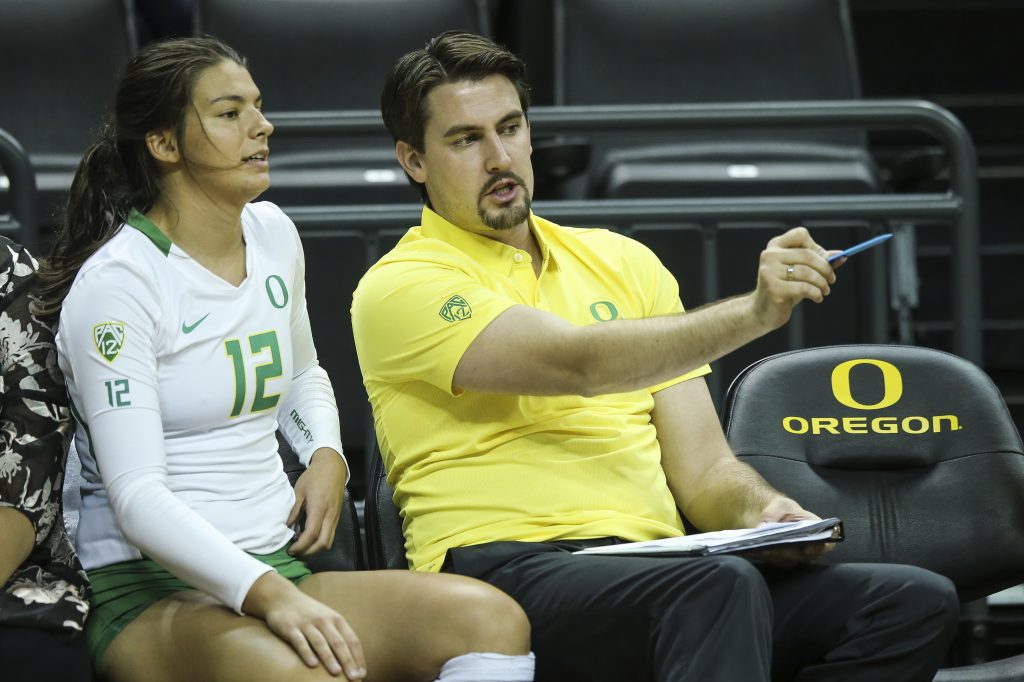
Relationship Building
Coach Ulmer preaches stability, as he sees this to be important not only in life but in having a good culture. Something he looks to continue in Oregon.
“For me, I always knew it would be a head coach, so that was my big picture at the end. I didn’t know how I was going to get there but that was the goal. I made the move to Oregon and I’ve been in Oregon for seven years. I’m happy to just be in one place and I don’t want to hop around. Other people want to see a lot of different things and learn from a lot of different coaches. And I can completely understand the benefits of doing that as well. But, I think for me, I like stability.”
Stability is something that usually doesn’t get a lot of attention in the coaching community. But in building a good team culture and creating relationships with players. Being there consistently is important. Something Coach Ulmer puts at the forefront.
“With women, building relationships is important. Guys, I’m not sure you guys need that as much. I think guys want to hear “tell me I’m good enough” and with women, they need to feel it. So developing that relationship with the women I’ve coached, I think is important. And the same goes for the focus of our assistant coaches. Putting enough repetitions and going through the game enough so that they feel confident in their abilities.”
Ulmer explains, after being around men and women’s volleyball. There is a big difference in how you must handle coaching.
“I think probably the biggest difference is that men are overconfident. We think we’re the best all the time, whether it’s factual or just completely unrealistic. For some reason, we think highly of ourselves where women are the exact opposite. I’m working on trying to build them up, trying to give them confidence that they can do it. Teaching them the skill so that they feel confident being out there and wanting the ball in crunch time.”
“The big thing in college is that all of a sudden, you have young women who don’t know who they are yet. They don’t know why they think or what they think. They don’t completely know what they believe in yet. They’re searching for that. And as a college coach, I’m getting them during that confusing “figuring it out time period”. And that can cause a lot of different things, you know. But if you’re patient, if you are willing to work with them and help them explore and make mistakes and figure it out. Then I found that you’re going to be rewarded at the end because then they become strong women that are ready to take on the world.”
Currently, Matt Ulmer is going through the Coach Development Academy with us here at Game Plan. Spending his extra time during COVID-19 to focus on how he can improve as a coach, on and off the court.
“For me, the professional development piece with the Coach Development Academy is huge and it’s the right time for me, being my third year as a head coach. Being able to sit back and reflect, especially during the year 2020, there isn’t a better time. I’ve enjoyed the CDA and I would recommend it to any level, all the way down to a volunteer. I wish I had done this sooner.”
University of Oregon women’s volleyball continues play this spring, where we look forward to seeing the ducks in action and Coach Ulmer leading the way.



